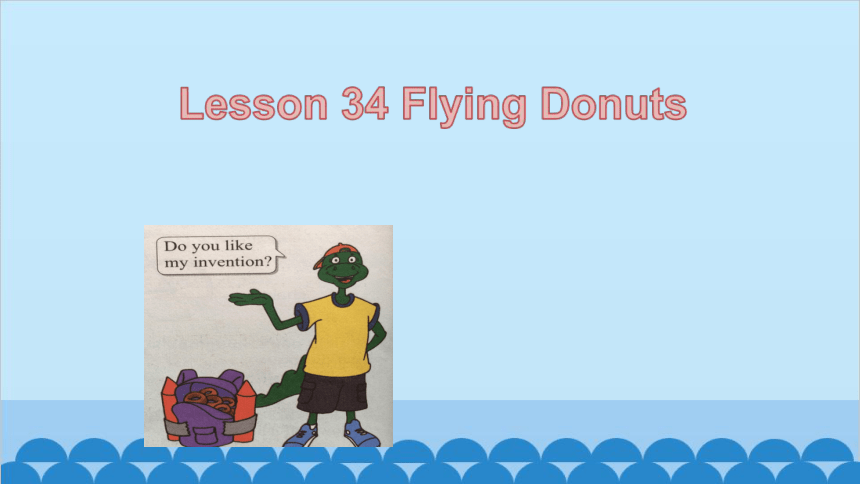(
课件网) What kinds of transportation can you name Planes, trains and cars are very important inventions. We can travel faster and farther with them. invent v. 发明;创造inventor n. 发明家 invention n. 发明;创造 Look! This is Danny’s new invention. He stayed up late to make his invention last night. He calls it “Flying Donuts”. stay up late 熬夜 Don’t _____. It’s not good for your health. stay up late backpack n. 背包 The two rockets are made of cardboard(n.硬纸板) The donuts are the fuel. One donut will carry you one kilometre. fuel n. 燃料 For example: Oil (石油)is a kind of important _____. fuel Will Danny’s invention really work Probably not. probably adv. 大概; 很可能; 也许 _____ they will go there by air. Probably 1.What did Danny invent 2.What’s its name 3.What’s it made of A new kind of transportation. Flying Donuts . It’s made of an old backpack, two cardboard rockets, some donuts. Flying Donuts Read and answer 4.What do the donuts do 5.How far does Danny think one donut will carry him 6.Will Danny’s invention really work The donuts are the fuel. One donut will carry him one kilometre. No , it won’t. Focus on 1. Last night, Danny stayed up late to make his invention. stay up late“熬夜;睡得很晚”,不及物动词短语。 ● Doctors suggest that people should not stay up late even on holidays. 医生建议,即使在节假日人们也不应该熬夜。 2. In the morning, on his way to school, he bought ten donuts. on the / one’s way to sp. 意为“在去……的路上”。 当表示地点的词 是副词时,则要省略to。 ● I met my sister on my way to the station. 在去车站的路上,我遇到了我的姐姐。 ● Don’t play on your way home. 不要在回家的路上玩耍。 3. Now Danny is standing at the front of the classroom. in front of…“在……的前面”,指某一范围以外的前面。 at/in the front of…“在……的前面”,指某一范围以内的前面。 ● Miss Gao is standing at the front of the classroom. 高小姐站在教室的前面。 (指某一范围内的前面) ● There is a tall tree in front of the house. 房子前面有一棵大树。 (指某一范围以外的前面) ● Let's sit in the front of the bus. 我们坐在公共汽车的前部。(指某一范围内的前面) 4. I would like to present my invention. would like 意为“想要”,后跟名词或动词不定式。 ● He would like some bananas. 他想要一些香蕉。 ● I would like to play football with you. 我想跟你去踢足球。 5. With my invention, you don’t need an airplane to fly. with 在这里的意思是“(表示手段或方法)以……,用……”。 ● We walk with our feet. 我们用脚走路。 ● We write with pencial. 我们用铅笔写字。 ① with 意为“具有,带有”。 ● China is a large country with a long histiry. 中国是一个幅员辽阔、历史悠久的国家。 ② with (表示伴随)意为“与……一道,同……一起”。 ● The teacher came into the classroom with two books in his hand. 老师拿着两本书走进教室。 ③ with (表示原因或理由) 意为“因为,由于”。 ● He has made some progress with his teacher’s help. 在老师的帮助下,他取得了一些进步。 ④ with 意为“在……身上,在……身边” ... ...

